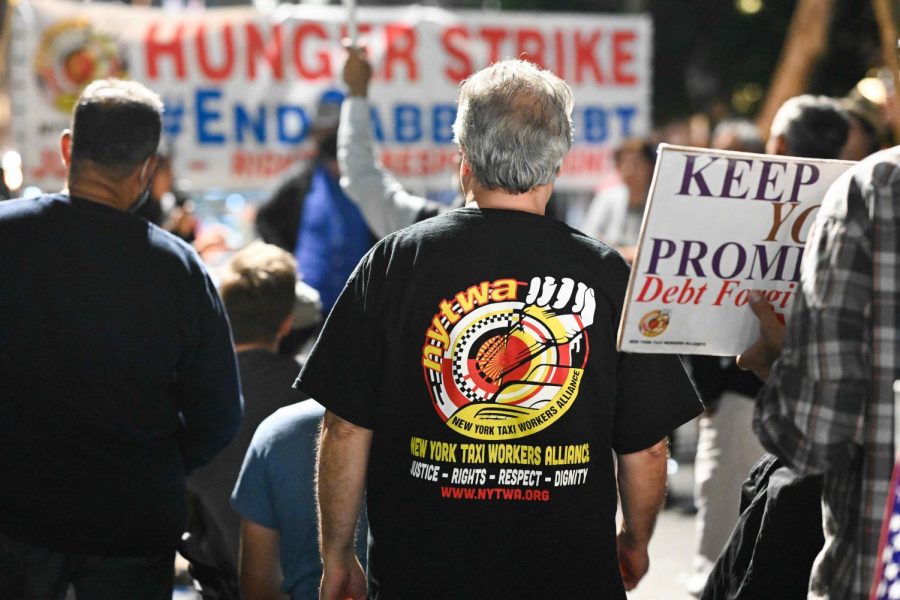NYC taxi workers strike deal, end hunger strike
Taxi workers of New York City and their supporters ended a two-week hunger strike after negotiating a debt relief agreement with the city and a private equity firm.
A person wore a New York Taxi Workers Alliance T-shirt at the hunger strike on Oct. 20. The two-week hunger strike ended on Nov. 3 with a successful negotiation of a debt relief agreement. (Staff Photo by Sirui Wu)
November 8, 2021
A two-week hunger strike organized by the New York Taxi Workers Alliance ended on Nov. 3 after the union representing New York City taxi drivers negotiated a debt relief agreement with the city government and the largest private equity firm financing taxi medallions in the city.
“After a long and painful journey, we made it home to victory,” Bhairavi Desai, the executive director of NYTWA, said in a press release. “Drivers will no longer be at risk of losing their homes, and no longer be held captive to a debt beyond their lifetime. The city we love had our back and so today we can say, we have won.”
Marblegate Asset Management, the private equity firm the union negotiated with, will now supplement the New York City Medallion Relief Program with a city-backed guarantee to reduce principal and monthly payments on medallion debt and restructure existing loans. The firm, which controls almost one-third of the city’s taxi medallions, forgave $70 million in debt and extended loan payment deadlines several times over the pandemic.
NYTWA held a 24-hour picket line outside of City Hall for 45 days and began a hunger strike on Oct. 20 to protest Mayor Bill de Blasio’s initial $65 million Medallion Relief Program and to call for workers’ rights and partial debt relief.
The prices of taxi medallions — which drivers are required to own in order to legally drive an independent cab — have fluctuated intensely. The medallion was valued at about $1 million in 2014 but plummeted to $100,000 this year, leaving the average taxi driver with half a million dollars in debt.
Illapa Sairitupac, a community organizer and democratic socialist, is a candidate for the New York State Senate’s 26th district. He attended the picket line several times, and said that when he heard about the debt forgiveness deal that NYTWA secured, he was moved to tears.
“This could have been swept under the rug,” he said. “This effort could have been completely diminished in some way and luckily, everything came together. It is a victory for us and for our workers who are the backbone of the city, but we need more.”
Jake Colosa, a CAS senior and member of the Young Democratic Socialists of America’s National Coordinating Committee, said there was a consistent presence of NYU students, including NYU’s YDSA chapter, on the picket line.
“Every time I was at the picket line, there were other students there too,” Colosa said. “While not having any structural power over the city, student presence on the picket line helped boost the morale of the drivers and hunger strikers throughout the coldest and most difficult days of the strike.”
At least one NYU student, CAS junior Karishma Chari, participated in the hunger strike. Chari, an NYU YDSA campaign coordinator, did not eat for 52 hours in solidarity with taxi workers and their families and concluded her hunger strike on Nov. 2. Chari said that the deal reached did not address all of NYTWA’s demands, but it was a big step in the right direction.
“The success of NYTWA has shown many involved on the picket that despite what the government or your boss might have you believing, you do not need to settle for crumbs,” Chari said.
Steinhardt senior Gabriel Avalos, a member of NYU YDSA’s organizing committee, attended the picket line several times and organized small groups of other NYU students to join the taxi workers. He attended in support of NYTWA to advocate for justice for immigrants and workers.
“It was incredibly powerful to talk to the striking taxi drivers and hear firsthand how the city was failing to adequately respond to their needs,” Avalos said. “Being part of the picket line reminded me that taxi drivers were not alone in their fight for justice and that workers can win hard-fought battles when we organize and bring members from our community together.”
Although Colosa does not have any personal connections to the taxi workers, he said he is committed to fighting for workers’ rights as a member of NYU YDSA.
“Seeing the joy and celebration when the deal was reached and watching the hunger strikers eat their first food in two weeks was touching and so inspiring to see,” Colosa said. “After following this strike for weeks, it was incredible to see them win and knowing that I had even a small part in that victory means the world to me.”
A version of this story appeared in the Nov. 8, 2021, e-print edition. Contact Abby Wilson at [email protected].

























































































































































